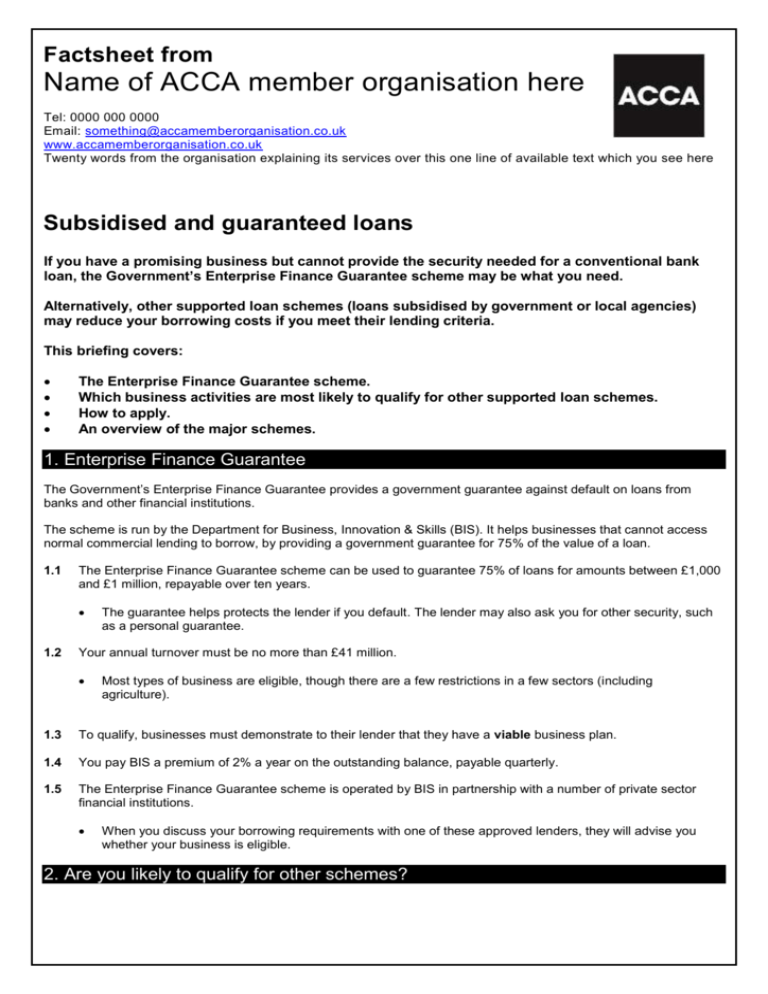
Factsheet from
Name of ACCA member organisation here
Tel: 0000 000 0000
Email: something@accamemberorganisation.co.uk
www.accamemberorganisation.co.uk
Twenty words from the organisation explaining its services over this one line of available text which you see here
Subsidised and guaranteed loans
If you have a promising business but cannot provide the security needed for a conventional bank
loan, the Government’s Enterprise Finance Guarantee scheme may be what you need.
Alternatively, other supported loan schemes (loans subsidised by government or local agencies)
may reduce your borrowing costs if you meet their lending criteria.
This briefing covers:
The Enterprise Finance Guarantee scheme.
Which business activities are most likely to qualify for other supported loan schemes.
How to apply.
An overview of the major schemes.
1. Enterprise Finance Guarantee
The Government’s Enterprise Finance Guarantee provides a government guarantee against default on loans from
banks and other financial institutions.
The scheme is run by the Department for Business, Innovation & Skills (BIS). It helps businesses that cannot access
normal commercial lending to borrow, by providing a government guarantee for 75% of the value of a loan.
1.1
The Enterprise Finance Guarantee scheme can be used to guarantee 75% of loans for amounts between £1,000
and £1 million, repayable over ten years.
1.2
The guarantee helps protects the lender if you default. The lender may also ask you for other security, such
as a personal guarantee.
Your annual turnover must be no more than £41 million.
Most types of business are eligible, though there are a few restrictions in a few sectors (including
agriculture).
1.3
To qualify, businesses must demonstrate to their lender that they have a viable business plan.
1.4
You pay BIS a premium of 2% a year on the outstanding balance, payable quarterly.
1.5
The Enterprise Finance Guarantee scheme is operated by BIS in partnership with a number of private sector
financial institutions.
When you discuss your borrowing requirements with one of these approved lenders, they will advise you
whether your business is eligible.
2. Are you likely to qualify for other schemes?
Each supported loan scheme has its own eligibility criteria. These tend to fall into the same four categories — purpose,
location, industrial sector or the availability of extra financing.
2.1
Broadly speaking, all supported loan schemes are intended for the purpose of creating or protecting jobs.
You need to show your project will make a positive contribution to employment.
This could include training and skills development.
Loan schemes favour projects with a high growth potential.
Loan schemes are often only available for capital projects such as investment in plant and equipment or
computer networks, but not where conventional asset finance is available.
The gradual process of company development does not normally qualify.
Purely local consumer services, such as shops, are likely to be excluded.
2.2
You may be eligible for supported loans if you intend to establish your business in an economically depressed
location, particularly if you are going into an area with a high level of unemployment.
2.3
Most loan schemes favour particular industries — usually in the manufacturing and industrial sectors.
2.4
Crafts, tourism, and distribution operations also receive some support.
Most schemes insist that extra financing is available alongside the loan.
You usually have to show commitment by providing part of the finance yourself.
More detailed criteria for the most commonly available loan schemes are shown in 4 to 6.
3. Applying
3.1
Some schemes are operated by banks and other commercial lenders.
Apply for these schemes as you would apply for a conventional loan.
The lender decides whether your proposal should be taken any further.
3.2
Local schemes (see 4) usually involve simple application procedures.
3.3
You may have to wait until the next meeting of the committee that allocates the loan fund. Many committees
meet every month or each quarter to assess applications.
Regional schemes may have more complex application procedures.
The lender may ask you to submit a simple Stage 1 application so that your chances can be evaluated.
You can then decide whether or not to proceed with a full Stage 2 application.
4. Local schemes
4.1
Local business support organisations and councils can help you identify schemes are available in your area.
4.2
Most of the UK’s larger cities have schemes which provide loans.
Each scheme has its own priorities and lending criteria.
2
4.3
Loans may be targeted at a particular industry sector (eg businesses in the creative industries) or
businesspeople from a particular background (eg women, people with a disability or from minority ethnic
communities).
Some schemes specifically target businesses with a social purpose rather than those that are strictly for
profit.
Loans may be available for start-ups, existing businesses or both.
Loan amounts and terms can vary.
Schemes typically offer relatively small loans of up to £10,000 but there are exceptions.
5. Regional and national schemes
5.1
Businesses in Wales may be able to borrow from Finance Wales.
Micro loans of between £5,000 and £25,000 are available for businesses that can demonstrate growth
potential.
Larger amounts of development capital are also available, as loans, equity or a combination of both.
Consumer businesses (whose main customers are the general public rather than other businesses) are not
eligible.
Contact Finance Wales (0800 587 4140; www.financewales.co.uk).
5.2
There are several funds offering loans to businesses in Scotland.
Both the West of Scotland Loan Fund (www.wslf.co.uk) and the East of Scotland Investment Fund (01738
448323; www.eastscotinvest.co.uk) offer loans of up to £50,000 to businesses in eligible sectors.
Larger businesses may be able to borrow from the Scottish Loan Fund. You must have a turnover of at least
£1 million and be looking for a loan of at least £250,000.
Find out more about the Scottish Loan Fund by contacting Maven Capital Partners (0141 306 7400;
www.mavencp.com).
5.3
Businesses in Northern Ireland may be able to borrow from the Enterprise Northern Ireland Loan Fund.
Existing businesses can borrow between £1,000 and £25,000 for up to five years.
New start-ups can borrow up to £10,000 for a maximum of three years.
Contact Enterprise Northern Ireland (028 7776 3555; www.enterpriseni.com).
5.4
Regional funding in England is currently limited.
5.5
Loans were available through Regional Development Agencies, but these were abolished on 1 July 2012.
New loan programmes may become available through their successor organisations, Local Enterprise
Partnerships.
Additional funding opportunities may be developed by Capital for Enterprise Limited
(www.capitalforenterprise.gov.uk), the Government’s centre of expertise on finance for smaller businesses.
Businesses in former steel areas may be able to borrow from UK Steel Enterprise.
Loans are provided to new and existing businesses based in or relocating to one of the designated steel
areas.
Fixed rate loans of up to £750,000 are available, typically for a term of three to four years.
Smaller loans can be provided without requiring security and without additional administration charges.
Contact UK Steel Enterprise (0114 273 1612; www.uksteelenterprise.co.uk).
5.6
Various schemes target particular groups or sectors of the community.
3
Businesses in deprived communities may be able to borrow from a Community Development Finance
Institution (see www.findingfinance.org.uk).
The Prince’s Trust Enterprise Programme (www.princes-trust.org.uk) provides small start-up loans for new
businesses started by individuals aged between 18 and 30.
Entrepreneurs aged 50 or older may be able to borrow up to £10,000 as a PRIME Business Start-up Loan
(www.prime.org.uk).
6. Where to get help
6.1 Business support organisations can help you identify loan schemes, grants and any other funding your business
may qualify for. For example, loan schemes run by local authorities and Learning & Skills Councils.
.
6.2 If necessary, get professional help.
Some accountants and consultants specialise in preparing loan applications.
Check their record of obtaining loans for businesses like yours.
Negotiate the fees.
Flat-rate fees are less expensive, but must be paid even if your application is unsuccessful and you get no loan.
6.3 Visit www.j4bgrants.co.uk to search an online database that can help you find out about the variety of loan
schemes on offer.
6.4 Avoid loan cowboys.
Some companies will charge you a fee to identify supported loans you may qualify for.
There is no guarantee you will qualify, and exactly the same information is generally available free of charge or at a
heavily subsidised rate through your local business support organisation.
Some companies will guarantee to return your fee if they fail to arrange a supported loan for you.
Read the small print. The conditions they impose often make this kind of guarantee worthless.
One step at a time
Applying for supported loans can be a lengthy process.
A.
Make personal contact with an individual involved in administering the loan scheme.
B.
Get advice on whether it is worth applying.
Ask for help with completing the application.
Get answers to some basic questions.
Are loans still available?
Some schemes only lend a set amount of money each year.
What is the loan scheme intended to achieve?
Your application must show that your project enables the scheme to achieve its aims.
How much does the loan cost?
4
The total cost consists of charges plus interest payments.
C
Submit the proposal
D.
When will the loan have to be repaid?
How long is the application process and what does it involve?
Your proposal must include details of the activity you plan, and a cashflow forecast that shows how the loan
will be used.
Wait for the decision.
You may have to refine your project idea if the wait is too long.
Do not include the loan in your real cashflow forecast until you are certain you will receive it.
Career development loans
Sole traders who want to learn new skills may find a Professional and Career Development Loan more appropriate.
These are similar to normal personal loans and are used to finance vocational learning or educational courses. For
example, NVQs.
You can get a loan of between £300 and £10,000 to cover up to 80% of your course fees (100% if you have been out
of work for three or more months). The Government will pay the interest on your loan during the course. You then
repay the loan to the lender over an agreed period at a fixed rate of interest.
Loans are available through Barclays and the Co-operative Bank.
Call Careers Advice Service on 0800 100 900 or visit the Directgov website (www.direct.gov.uk/pcdl).
Experts’ quotes
“It’s a good idea to match the life of the asset to the life of the loan. If the project runs over three years — apply for a
three-year loan.”
Richard Holloway,
management consultant
Expert contributors
Thanks to; Richard Holloway (Aditum, 020 8123 4678).
Last reviewed 01.10.12
© BHP Information Solutions 2012. ISSN 1369-1996. All rights reserved. No part of this publication may be reproduced or transmitted without the
written permission of the publisher. This publication is for general guidance only. The publisher, expert contributors and distributor disclaim all liability
for any errors or omissions. Consult your local business support organisation or your professional adviser for help and advice.
5








